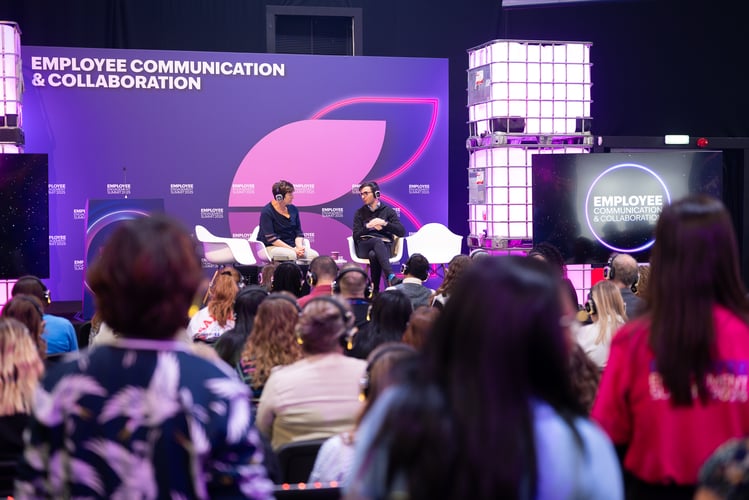10 Minutes With Ciprian Arhire, Global Head of People Programmes & Analytics at Entain Group

Can you tell us a bit about yourself and what you do?
I’m Ciprian Arhire, most recently Global Head of People Programmes and Analytics at Entain, where I led a large-scale HR transformation with complex global reach, spanning 42 countries and impacting 30,000+ colleagues. My work sits at the intersection of people, technology, and change. I’m passionate about designing future-ready HR functions and experiences that feel human, data-informed, and inclusive. Day to day, I work with transformation teams, business leaders, and HR partners to embed meaningful change, whether that’s through AI-led automation, rethinking how we communicate at scale, or making analytics actionable. Beyond Entain, I speak regularly at global HR conferences, host a podcast on the future of work, teach HR leaders at an academy and serve as a charity trustee, all of which deepen my perspective on what truly drives people engagement and prepare us for the future.
What first got you interested in employee engagement?
Honestly, it actually started with frustration. I saw too many brilliant initiatives fall flat because people didn’t feel connected to them. That pushed me to explore the deeper drivers of motivation, behaviour, and emotional connection, which led to my ongoing interest in behavioural science. Engagement, to me, is more than a metric, it’s about creating a workplace where people want to show up emotionally, not just physically. It’s also where engagement meets experience. Employee engagement asks, “How involved are they?” But people experience asks, “What does it feel like to work here?” And that question has shaped much of my work since, from reimagining HR tech to redesigning change journeys that feel human, not corporate. My interest grew into a career-long mission: to bridge the gap between corporate transformation and the real, felt experience of the people behind it.
Your session at the summit focused on Personalising Change Communication for Transformation. Why was that topic important for you to explore this year?
In a world of transformation fatigue and AI-driven change, communication can’t be one-size-fits-all. My session explored how to bring personalisation into the heart of change communication, not just by using tech like journey mapping or comms automation, but by understanding the lived experience of change from different employee perspectives. I shared real examples from our global rollout of new processes, tools and experience powered by our tech, connected the tailored messaging and behavioural insights to helped drive adoption and trust. Right now, organisations can’t afford to just inform people, we need to inspire them to act, we need to tackle their aspirations and reduce their frictions and pain points to motivate adoption.
What’s one key takeaway you hope attendees walked away with?
That change is never just about systems, it’s about stories and the experience you're trying to create, informed by the known or unknown needs of your customers. The best engagement happens when we move from “announcements” to conversations that are relevant, timely, and emotionally resonant. People don’t resist change; they resist confusion and pointless updates. Clear, personalised communication that talks about the better experience is your biggest asset.
Can you share an example of something that’s worked well in your experience to boost engagement?
We introduced “behavioural personas” in our people programmes behavioural profiles based on real user data, not assumptions. That helped us reframe how we design and communicate change, from performance reviews to digital tools. When people see themselves reflected in the narrative, they lean in. Engagement went up, and so did satisfaction with our new platforms. Personas fuelled our change impact assessment, our journey mapping, process design and empathy maps. They've been the spark we needed to succeed.
What’s a common mistake you see organisations make when it comes to engagement?
One of the biggest mistakes I see is treating engagement as an HR-owned metric rather than a shared business priority. Engagement isn’t just about surveys, benefits, or launching another pulse check, it’s about creating the conditions for trust, clarity, and genuine belonging to emerge. Another common pitfall? Designing initiatives for HR or even worse... for employees without involving them. If your people aren’t actively contributing to the experience or design process, they’re unlikely to feel invested in the outcome. Co-creation is no longer optional, it’s a necessity for anything you want to scale and sustain.
What trends are you watching when it comes to the future of employee engagement?
- AI for hyper-personalisation, not just in chatbots, but in how we tailor onboarding, feedback, and development journeys. How we use preferences of communication, notifications, prompts and design to ensure people get to design their preferred experience powered by AI rather than off the shelve.
- Manager enablement, the role of line leaders in shaping culture and connection has never been more important. Research says people experience is up to 80% dependant on the manager you have and managers are not trained, equipped, empowered or informed on how they can deliver positive impact. Advanced tools and technologies are making that simpler and easier by the minute, from coaching to intelligent prompts, to people profiling and reminders for 1to1s
- Experience design at scale, using behavioural insights, agile methods, and cutting-edge technology to shape truly human-centric workplaces. This means designing every touchpoint, from onboarding to feedback tools, based on real behavioural data and iterating continuously based on user input. We're not just launching programmes; we're prototyping, testing, and refining them in real time.
AI helps us personalise journeys. Design thinking ensures it's intuitive. Behavioural science makes it stick. The result? Experiences that feel seamless, relevant, and built with people, not just for them. And finally, collective intelligence, using tools like nudges, voting, and AI-supported decision-making to make engagement more democratic.
Finally, what’s one book, podcast, or resource you always recommend to others in tHIS SPACE?
The Human Experience at Work by Ben Whitter is a timely read, it explores how to design work around people, not just process, and dives into the emotional and cultural levers of engagement. For podcasts, I’d recommend the HR Leaders Podcast by Chris Rainey, which features practical stories from global HR leaders and their organisations (you'll find an episode with me there), and Unlocking Us with Brené Brown for a deeper look at human emotion and connection. I’d also add my own podcast, Leading HR into the Future, we’re preparing a relaunch and a great season with bold conversations on AI, culture, and transformation.
If you enjoyed this article, you can register your interest in attending the 2026 Employee Engagement Summit for free to explore the latest trends, innovative strategies and cutting-edge technologies driving exceptional engagement and results in today’s landscape.





